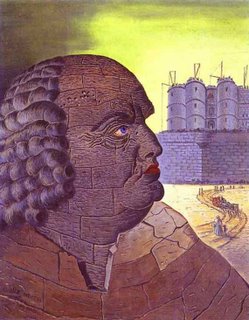The Learning Moment

The other night, a University professor and I were visiting. He was European I think. As any respectable dinner conversation would demand, we strolled into the international news and current events lane for a little spin.
Over the last few weeks, there has been a great amount of turmoil over a cartoon characterization of the Prophet Muhammad with a bomb in his head. Muslims all over the world have demonstrated.
I suggested that the cartoon was remarkably consistent with my memory of the history of the Prophet who founded Islam and that of all the prophets, Muhammed was the only one I knew of who applied organized violence during his lifetime.
The Professor agreed.
Here is a brief look at his life.
Muhammad was born into a well-to-do family settled in the northern Arabian town of Mecca. Some calculate his birthdate as April 20, 570 (Shia muslims believe it to be April 26) , and some as 571; tradition places it in the Year of the Elephant.
Muhammad's father, Abdullah, had died before he was born and the young boy was brought up by his paternal grandfather Abd al-Muttalib, of the tribe of Quraysh. Tradition says that as an infant, he was placed with a Bedouin wetnurse, Halima, as desert life was believed to be safer and healthier for children.
At the age of six Muhammad lost his mother Amina, and at the age of eight his grandfather Abd al-Muttalib. Muhammad now came under care of his uncle Abu Talib, the new leader of the Hashim clan of the Quraysh tribe, the most powerful in Mecca.
Mecca was a thriving commercial center, due in great part to a stone temple called the Ka'aba that housed many different idols. Merchants from different tribes would visit Mecca during the pilgrimage season, when all inter-tribal warfare was forbidden and they could trade in safety.
As a teenager Muhammad began accompanying his uncle on trading journeys to Syria. He thus became well-travelled and knowledgeable as to foreign ways.
Muhammad became a merchant and one of his employers was Khadijah, a widow then forty years old. The young twenty-five-year old Muhammad had impressed Khadijah, and she proposed to him in the year 595.
Ibn Ishaq records that Khadijah bore Muhammad five children, one son and four daughters. All of Khadija's children were born before Muhammad received his first revelation. His son Qasim died at the age of two. The four daughters are said to be Zainab, Ruqayyah, Umm Kulthum, and Fatimah.
Muslims believe that around the year 610, while meditating, Muhammad had a vision of the Angel Gabriel.
His wife Khadijah and her Christian cousin Waraqah ibn Nawfal were the first to believe Muhammad was a prophet. She was soon followed by his ten-year-old cousin Ali ibn Abi Talib, and Abu Bakr, whom Sunnis assert to have been Muhammad's closest friend.
Until his death, Muhammad reportedly received frequent revelations, although there was a relatively long gap after the first revelation. This silence worried him, until he received surat ad-Dhuha, whose words provided comfort and reassurance.
Around 613, Muhammad began to spread his message amongst the people. Most of those who heard his message ignored it. A few mocked him. Some, however, believed and joined his small group.
For most of the sixty-three years of his life, Muhammad was a merchant, then a prophet. He took up the sword late in his life.
He was a warrior for ten years.
Much criticism has been leveled at Muhammad for engaging in caravan raids and taking part in battles. Critics say that his wars went well beyond self-defense.
Muslim commentators, however, argue that he fought only to defend his community against the Meccans, and that he insisted on humane rules of warfare."
There is no argument that he employed the sword.
However, before I get put on some list somewhere,
let me make it absolutely clear that I have nothing to say of
the Prophet's use of organized violence.
It is simply a historical fact.
What I do have to say is about the use of organized violence,
by those who claim a different Master.
And He made it clear.
He even healed the ear of the guard that Peter cut off
as he was being arrested in the Garden.
Deepak Chopra says it well here.
People seem to assume that the moment you brand someone else as evil (terrorists, Nazis, mass murderers, pedophiles, etc.), you have every right to seek revenge against them. The War on Terror is based on this notion. The first person to disagree, however, happens to be Jesus, which our right-wing religious hawks seem to ignore. If you look at the passage in the New Testament where Jesus says to turn the other cheek (Matthew 5:38-42), the whole speech illustrates how radical Jesus's morality actually was.
In a World standoff over declining finite resources,
and in a World desperately in need of environmental leadership,
where one group is living their teachings
while the other is not,
It seems that a learning moment is at hand.
Let us keep this learning moment in our hands,
Let us wage peace.
Home
What it is About
Earthfamily Principles
Earthfamilyalpha Content II
Earthfamilyalpha Content
Links
LANGUAGE TRANSLATIONS













